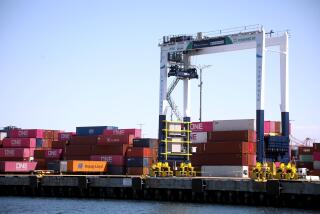Many Bumps Await on ‘Hydrogen Highways’
- Share via
Re “Governor Pushes for ‘Hydrogen Highways,’ ” Jan. 20: I’m all in favor of “Hydrogen Highways,” but there’s a growing misconception about hydrogen fuel. In the hydrogen economy, hydrogen is not a source of energy but only a means of storing and transporting energy. The energy must come from elsewhere.
Even though hydrogen is the most abundant element in the universe, there is no free hydrogen on Earth. It is all bound up in other compounds. Energy is required to separate the hydrogen from other compounds. This energy is then released when the hydrogen is “burned.” Currently, almost all of the energy to produce hydrogen comes from use of fossil fuels, so our dependence on fossil fuels is not reduced, nor is pollution eliminated.
The key to a successful hydrogen economy is a clean, renewable source of energy that can be used to generate the hydrogen.
Gordon Rudd
Laguna Beach
*
Allow me, as a retired professional chemical engineer, to express some perhaps politically unacceptable concerns about the use of hydrogen as an automotive fuel. First, there is the fuel-storage problem. Hydrogen can be stored as a liquid at minus 423 degrees Fahrenheit, or as a highly compressed gas. Liquid storage would require very technically sophisticated and expensive insulation, such as that used in the space shuttle fuel tanks. And even then the evaporation loss would be on the order of several percent a day. Also, the energy density would be about one-fourth that of gasoline. If stored as a highly compressed gas, the energy storage density would be about one-tenth that of gasoline, thus severely limiting the driving range between refills.
Second, there is the problem of hydrogen production. The two main methods of hydrogen production are the electrolysis of water or the reforming of hydrocarbons as found in fossil fuels. The electrolysis of water merely moves the problem upstream to the electricity-generating plants. Renewable energy sources such as solar, wind and water power could supply only, at best, about 10% of what would be a greatly increased demand for electricity. The other 90% would have to come from burning more fossil fuels or a massive increase in nuclear power that would create its own problems of spent fuel storage and political unacceptability.
Joseph Friedman
Huntington Beach


